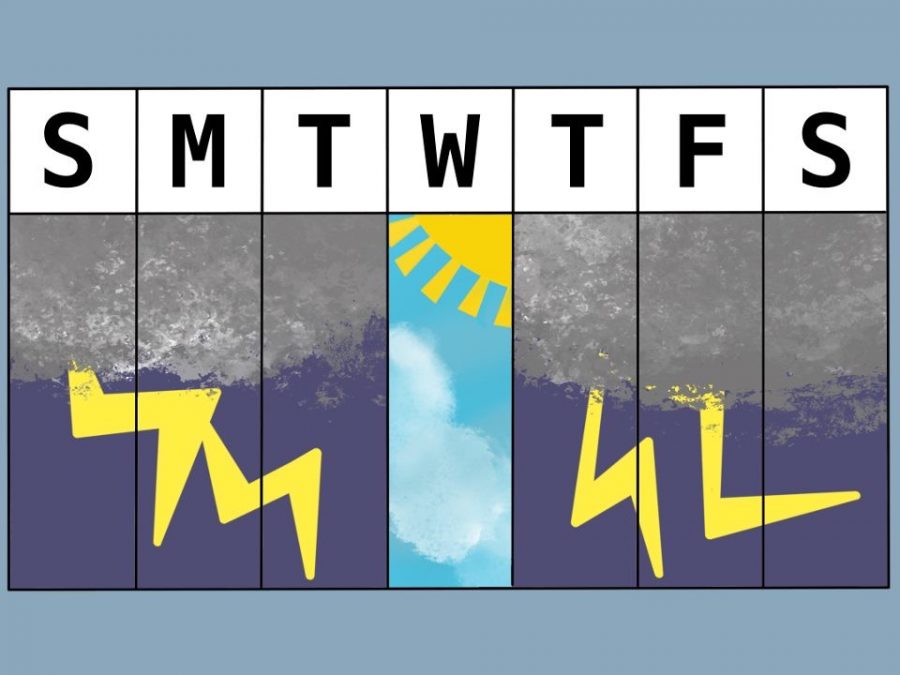The eye of the hurricane: Why Asynchronous Wednesdays should become standard
As the 2020-2021 school year comes to a close, questions still remain whether asynchronous Wednesdays should become a normal concept in future student life.
May 7, 2021
Unlike most changes made due to the pandemic, Atlanta Public Schools’s implementation of asynchronous Wednesdays has had a positive effect. Although this adaptation was made specially to accommodate the virtual environment, continuing asynchronous Wednesdays into next year’s in-person model would result in a happier and more productive student body.
Before the Covid-19 school year, Wednesdays were considered the most tiring day of the week for students. Eight classes were scheduled as opposed to the usual four, resulting in shorter periods, crowded hallways and heavy backpacks. Now, Wednesdays provide leniency for students and teachers and serve as an interlude from the strenuous school week.
However, despite the hectic halls and copious amounts of work, APS has decided to return scheduling back to normal for the 2021-2022 school year.
A study by Georgia State University found that a four-day school week resulted in higher math scores due to increased attention and participation of students, resulting in improved academic performance. The study found that students were given time to exercise, rest and study, all of which contribute to higher test results. This shows there is little evidence to prove removing one day in a school week would compromise student academic success, especially when students are still doing some work asynchronously.
Mental health is another aspect that should be considered when examining the benefits of asynchronous days. The New York Times found that both Utah and Oregon are considering the integration of mental health days into their curriculums to address the rise of depression and anxiety in teenagers. A study by Pew Research Center found that 70 percent of teenagers consider anxiety and depression a major issue. The Times found students benefit mentally and physically from shorter school weeks. By taking this time to focus on their mental and physical health, whether by getting more hours of sleep or relaxing, students are able to maintain healthier relationships with themselves, others and their academics.
Having a “catch-up day” has been shown to increase student participation and engagement in class. The National Conference of State Legislatures reports overall school attendance improves when students are required to attend class four days a week instead of five. In addition, parents and teachers are given the opportunity to schedule doctors’ appointments and other weekday commitments during that off period. This allows for flexibility for students to tend to other activities such as health appointments without missing any instruction.
Although students would have additional recreational and study time, for some, school is a safer space to be than at home. Lamar University has a different approach to the four-day school week and describes how certain students are provided regular meals, supervised recreation and meaningful adult attention. With this in mind, separate programs can be organized to further increase the academic and mental well-being of these specific students. These programs can be held in the building and could be offered to any who find it necessary. In terms of staff, teachers can choose to stay in person or hold virtual tutoring, providing assistance to students in a flexible and convenient manner.
There are concerns of a four-day school week resulting in students falling further behind academically. However, students who have fallen behind virtually this year would benefit from non-instructional, in-person days next school year. These days would serve as time to complete missing assignments, encouraging students to stay on track with the current curriculum. The combination of the leniency of asynchronous Wednesdays and the push of in-person school would result in a more successful student body.
The feeling of dread experienced by students on Wednesday mornings was no coincidence. Before the pandemic, Wednesdays felt like a waste of instructional time. With less than an hour spent in each period, students felt the tedious transitions from class to class were pointless. Now, Wednesdays are a sunny escape from the clouded disarray of the normal school week. Wednesdays provide students and staff with a moment to breathe, collect and prepare.
Acknowledging the faults in APS’s scheduling is critical when understanding what needs to be adjusted in order to create a greater learning environment. APS should use what has been learned from its adaption to the pandemic in order to improve future school years. Students will benefit physically, mentally and academically if the implementation of asynchronous Wednesdays remains constant throughout the 2021-2022 school year.













Naiomi • May 7, 2021 at 3:31 pm
I ove how this portrays the benefits for staff, students, and to all it may concern. The writer also brilliantly ties in sources and reasoning for their argument.